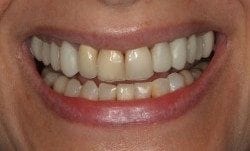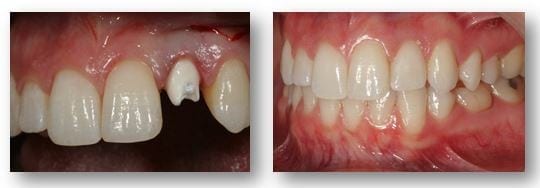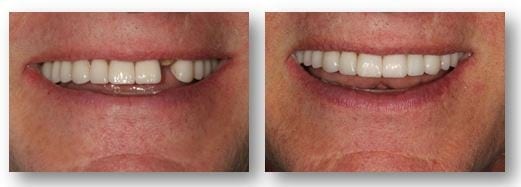With a success rate of 97%, Dental Implants are the longest-lasting, most economical solution for missing teeth. What makes dental implants so great? Well, to start, a dental implant replaces the lost root of the missing tooth. This provides a more stable replacement option compared to other types of restorations.
A dental implant can help prevent bone loss that occurs when a tooth is missing. A significant benefit of dental implants in Philadelphia, PA, is that they can replace a missing tooth without involving adjacent teeth. Dr. Conover uses dental implants to replace one, two, or a full arch of missing teeth.
Why Choose Dr. Conover for Dental Implants?
Dr. Conover is an experienced restorative and cosmetic dentist in Philadelphia, PA. His experience and hands-on training allow him to provide patients with the highest level of care and state-of-the-art dental implant treatment in our Center City Philadelphia dentist office.
To schedule a consultation or learn more about dental implants in Philadelphia, PA, please call us at (215) 395-6076 or schedule a visit online.
Learn More About Dental Implants
- Benefits of Dental Implants
- Dental Implants FAQ
- Dental Implant Process
- Cost of Dental Implants
- Dental Implants vs Dentures
- Single Dental Implant
- Multiple Dental Implants
About the Dental Implant Procedure
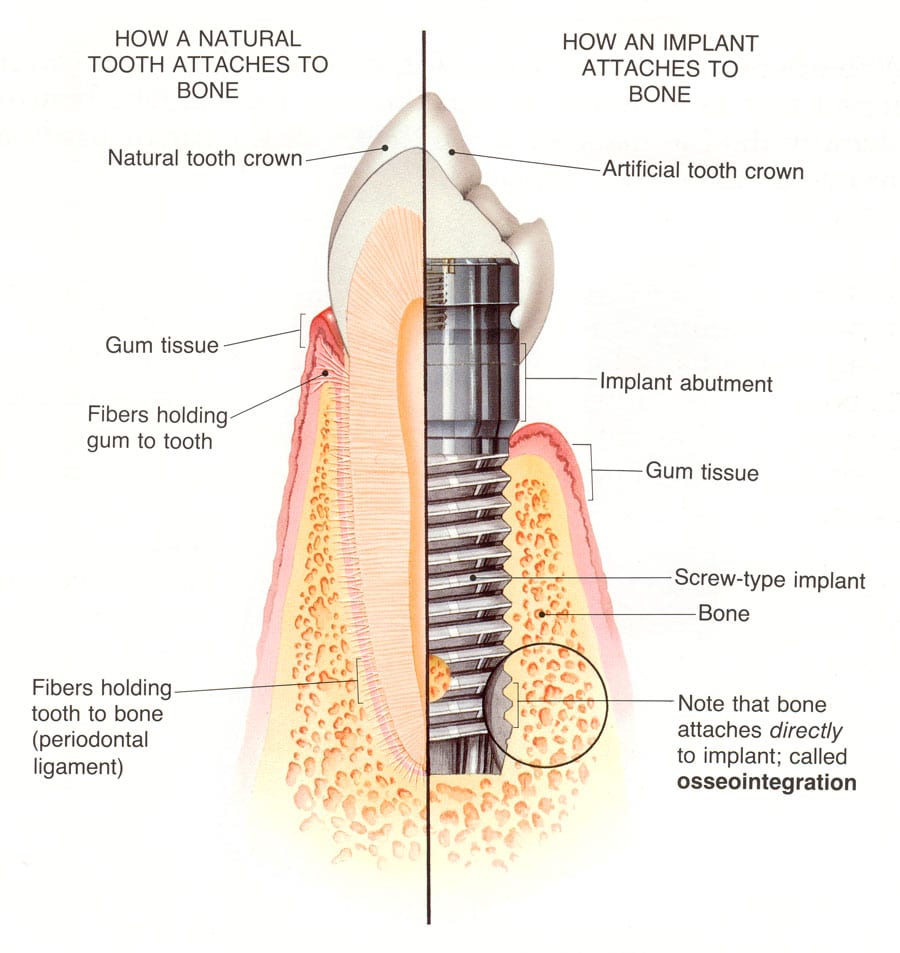
The dental implant procedure is a two-part process that often involves two or more highly trained dentists and specialists. Your treatment will begin with a comprehensive evaluation and consultation to examine your mouth, teeth, and bone structure to determine if you are a candidate for dental implants.
The first part of the dental implant procedure involves the extraction of the tooth (if it is still present) and implantation. A dentist performs oral surgery to install it in the jawbone, where it will integrate and become part of the living bone structure. This provides sturdy, long-lasting support for the prosthetic tooth. Furthermore, you cannot achieve this type of support with other lost teeth replacement options.
The healing process for dental implants varies but generally takes three to six months. During this time, you may have a temporary crown or bridge to restore aesthetics and function. The second part of the dental implant procedure involves the implant restoration. Dr. Conover will uncover the dental implant and attach an abutment.
Next, the new replacement tooth or teeth are secured. In the case of a single missing tooth, we will use a dental crown. For two or more missing teeth, we may use a dental bridge or hybrid denture.
Dental Implant FAQs
How Much About Dental Implants Do You Know?
Which of the following statements are true:
- A dental implant can replace a missing tooth without involving adjacent teeth.
- Dental implants can replace two or more missing teeth.
- They help preserve the jaw bone after tooth loss.
- The restorations are aesthetically pleasing and very comfortable.
- Dental implant technology has improved dramatically in the last decade.
The answer: ALL of the statements are true!
Brush up on your dental implant knowledge. Here are some of the most frequently asked questions about dental implants.
How much do dental implants cost?
Dr. Conover offers many types of dental implant systems and prices vary widely depending on the complexity of the case as well as the materials selected. You can expect dental implants to be in the neighborhood of $5000-$7000 per tooth.
Dr. Conover will perform a comprehensive consultation to evaluate your situation and provide a detailed treatment plan that includes associated costs. We offer several flexible payment options for dental implants, including interest-free financing through CareCredit. Learn more about the cost of dental implants here.
Why is a dental implant often the ideal choice for replacing a missing tooth?
A dental implant is a single-tooth solution for a single-tooth problem. While a dental bridge relies on neighboring teeth for support, a dental implant can be placed without affecting adjacent healthy teeth.
Because a dental implant is an actual root replacement, it helps to preserve bone that would otherwise be resorbed.
Dental implants can also be used to replace multiple missing teeth by supporting a permanent bridge or denture. Dr. Conover will evaluate your condition, assessing the quality and quantity of bone as well as facial anatomy to determine how many dental implants will need to be placed.
How long does the dental implant process take?
The process for dental implants ranges from one person to another but generally takes three to six months from extraction/implantation through final restoration. Learn more about the dental implant process here.
How does a dental implant work?
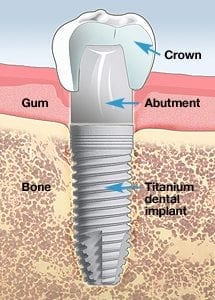
A dental implant consists of three different components:
Implant – The actual implant is a replacement tooth root, most commonly made of titanium. You may be familiar with the concept of hip, knee or other joint replacements and a dental implant is similar in that it replaces the root which is the support structure for the tooth.
Abutment – An abutment attaches to the implant to connect the dental crown. We install it on the implant after the implant has integrated with your jawbone.
Crown – The dental crown functions as the replacement tooth. The crown is made from a variety of materials, but it depends on the location of the tooth in the mouth and the aesthetic goals of the patient. Dr. Conover uses a variety of tooth-like materials that provide a very natural-looking restoration.
Will the dental implant process hurt?
The implantation is actually a very gentle procedure because working on bone is actually easier than working on teeth. It is a totally pain-free experience, and you will be able to return to work immediately following the procedure. It is normal to experience mild soreness after the anesthesia wears off. There will be little or no pain as the dental implant heals and integrates with the bone.
Will I be missing a tooth during the treatment?
Many patients are concerned about the appearance of a missing tooth during treatment, especially those who are missing teeth in the front of the mouth. Dr. Conover offers many options for temporary tooth replacement in the extraction site during the implantation and integration process.
We will evaluate your condition to determine the best options for your particular dental situation. In some cases, we can provide an ‘immediate loaded’ implant, where we place a temporary crown at the same time as the implant.
Read more frequently asked questions about dental implants here.
Before & After Dental Implants at Opus Dental Esthetics
Kat came to our Philadelphia dental office for a complete smile makeover. We placed new dental implants, crowns, and preformed a teeth whitening procedure. Our dentists restored Kat’s teeth to optimal esthetics and health! The result is a beautiful, natural looking smile.
